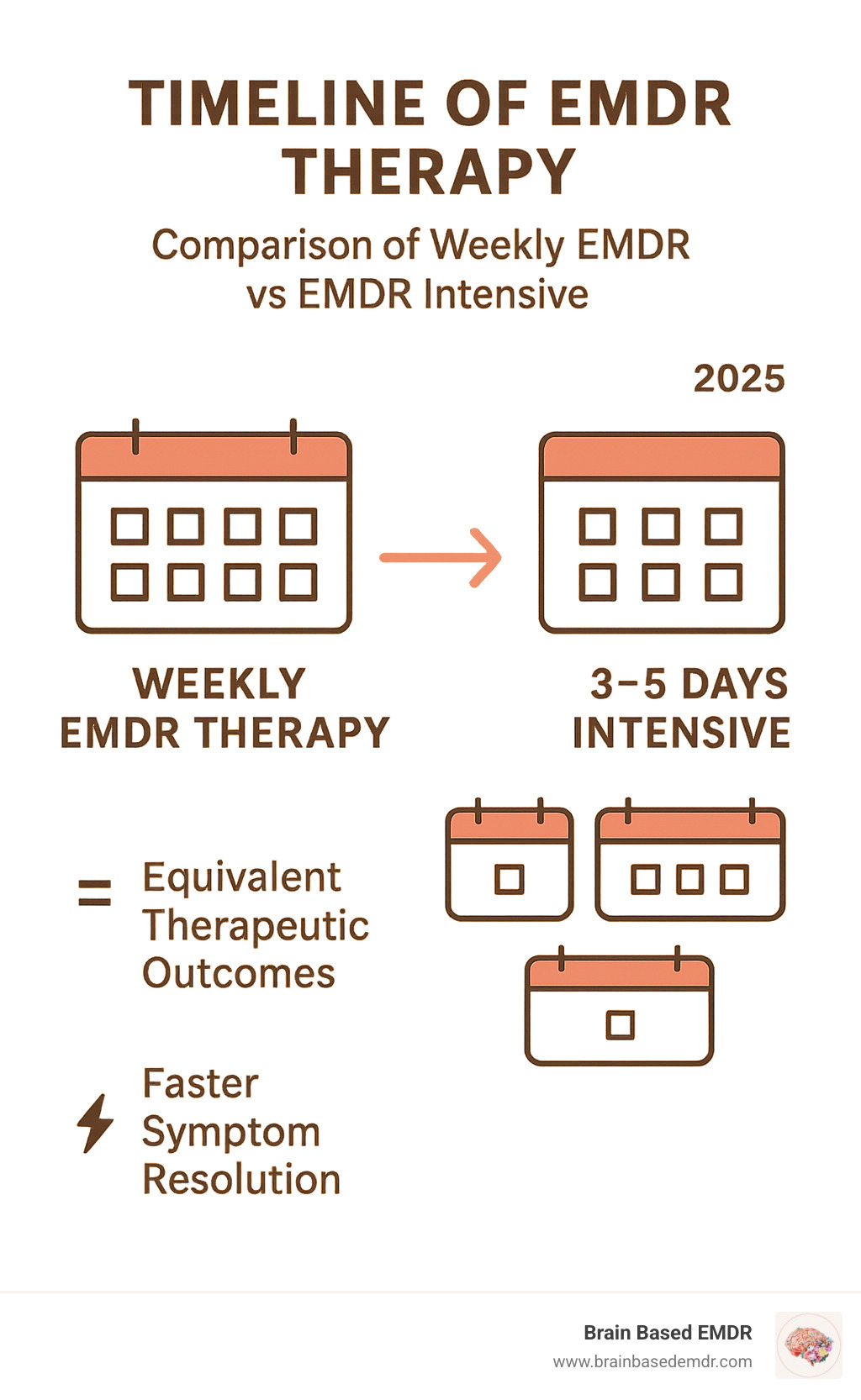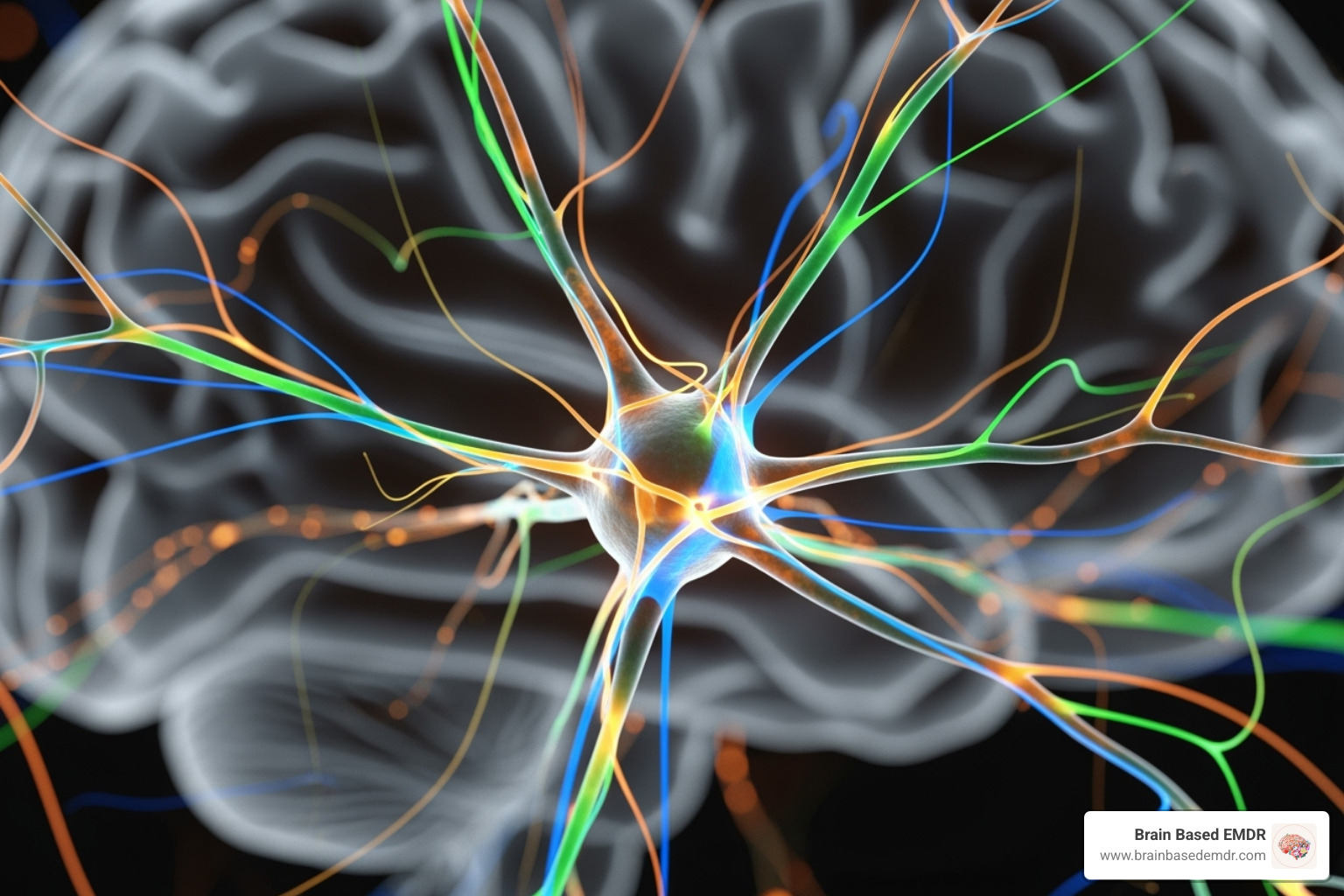Why Intensive EMDR Training Is Transforming Mental Health Education

The landscape of mental health professional development is evolving rapidly, and nowhere is this more evident in EMDR training methodologies. As a licensed mental health professional, you understand that traditional training formats—spread across months with long gaps between sessions—can make it challenging to maintain momentum and truly integrate complex therapeutic techniques into your practice.
Intensive training programs represent a paradigm shift in how mental health professionals master Eye Movement Desensitization and Reprocessing therapy, an evidence-based approach for treating traumatic experiences, complex PTSD, and various mental health conditions. Rather than fragmenting your learning experience across numerous weeks, intensive program formats allow you to immerse yourself completely in EMDR methodology, emerging with confidence and competency that translates immediately into enhanced client outcomes.
I'm Libby Murdoch, a licensed professional clinical counselor and recognized EMDR trainer at Brain Based EMDR who has witnessed firsthand how intensive training formats can accelerate professional growth and clinical effectiveness. Through my work developing specialized approaches including Resilience Focused EMDR, I've seen how concentrated learning experiences create lasting transformation for mental health professionals seeking to expand their trauma-informed care capabilities and better serve clients who have experienced traumatic experiences.
Understanding the Evolution of EMDR Training and Therapy
Eye Movement Desensitization and Reprocessing (EMDR) therapy has established itself as one of the most effective evidence-based treatments for trauma, PTSD, anxiety, and a wide range of mental health conditions. Developed by Francine Shapiro in the late 1980s, EMDR therapy utilizes bilateral stimulation and eye movement desensitization techniques to help clients process traumatic memories and achieve lasting therapeutic breakthroughs.
For mental health professionals, mastering EMDR therapy requires more than just understanding the theory—it demands hands-on practice, real-time feedback, and the opportunity to integrate neuroscience-driven concepts into your existing clinical framework. This comprehensive understanding enables you to effectively treat clients with complex PTSD, dissociative disorders, and various trauma presentations that require sophisticated therapeutic intervention.
The intensive program model addresses the limitations of traditional training by providing concentrated, immersive learning experiences that honor both the complexity of EMDR methodology and the practical realities of busy mental health professionals. When you engage in intensive training programs, you're not just learning techniques—you're developing the clinical confidence and therapeutic presence necessary to guide clients through profound healing experiences while understanding how the nervous system responds to trauma treatment.
What Makes Intensive Training Programs Different
Traditional EMDR training typically spreads basic certification across several months, with individual training sessions separated by weeks or even months. While this approach has merit, it creates challenges that many mental health professionals find frustrating and counterproductive when trying to develop competency in EMDR therapy.
Consider the analogy of learning to play a complex piece of music by practicing one measure per month versus immersing yourself in intensive sessions over consecutive days. The latter approach allows for the development of fluidity, timing, and intuitive understanding that fragmented learning simply cannot achieve when mastering complex therapeutic interventions.
Intensive training programs operate on this same principle. By concentrating your learning experience into focused, consecutive days, you maintain therapeutic momentum, develop deeper conceptual understanding of EMDR therapy applications, and achieve the kind of hands-on proficiency that translates directly into clinical effectiveness when treating traumatic experiences and complex presentations.
The neuroscience behind intensive learning supports this approach. When you engage in concentrated skill development, your brain forms stronger neural pathways and more robust memory consolidation than occurs with dispersed learning. For complex therapeutic modalities like EMDR therapy, this translates into greater retention, improved clinical judgment, and enhanced ability to adapt techniques to unique client presentations, including complex PTSD and dissociative disorders.

The Structure of Brain-Based Intensive Training Programs
Our Resilience Focused EMDR Training goes beyond traditional EMDRIA-approved basic training by integrating neuroscience-driven concepts, trauma-responsive strategies, and resilience-building techniques that enhance client outcomes when treating traumatic experiences. This comprehensive approach ensures that you're not just learning EMDR therapy techniques—you're developing a sophisticated understanding of how trauma impacts the nervous system and how EMDR facilitates neurological healing.
The intensive program format allows for deep exploration of complex concepts without the interruptions that characterize traditional training schedules. You'll engage in extensive hands-on practice, receive real-time coaching and feedback, and have opportunities to process your own learning and integration in a supportive, collaborative environment throughout the period of time dedicated to your professional development.
Day One: Foundation and Preparation
Your intensive program begins with comprehensive foundation building that establishes the theoretical framework for effective EMDR therapy practice. We explore the neurobiological basis of trauma, understand how EMDR therapy facilitates adaptive information processing, and examine the eight-phase EMDR protocol that forms the backbone of successful treatment for clients who have experienced traumatic experiences.
This foundational day also emphasizes the importance of therapeutic presence and nervous system regulation—both for you as the clinician and for your future clients. You'll learn advanced preparation techniques, resource installation methods, and strategies for creating the kind of therapeutic safety that allows for significant healing to occur when working with complex PTSD presentations and other challenging cases.
During this intensive program phase, we also cover treatment goals development and treatment plan creation, essential skills for effectively implementing EMDR therapy in various clinical settings and with diverse client populations.
Day Two: Protocol Development and Practice
The second day focuses intensively on protocol development and hands-on practice within the intensive program structure. You'll engage in multiple practice sessions, receiving individualized coaching and feedback that accelerates your skill development in EMDR therapy applications.
We also explore adaptations for complex trauma presentations, including parts work integration and somatic approaches that enhance traditional EMDR therapy methodology. These advanced concepts are woven seamlessly into your developing skill set, creating a more comprehensive and effective therapeutic toolkit for addressing traumatic experiences, complex PTSD, and dissociative disorders.
This day includes extensive work on understanding how different traumatic experiences require adapted approaches, from single-incident trauma to complex developmental trauma that affects the nervous system in varied ways.
Day Three: Integration and Advanced Applications
Your final intensive program day emphasizes integration and advanced applications that prepare you for the complexities of real-world clinical practice. We examine challenging case presentations involving complex PTSD and dissociative disorders, explore cultural considerations and adaptations, and discuss the integration of EMDR therapy with other therapeutic modalities.
This day also includes extensive discussion of professional development pathways, ongoing consultation needs, and strategies for building confidence as you begin implementing EMDR therapy in your practice. The collaborative learning environment ensures that you leave with both clinical skills and professional support networks necessary for continued growth in providing therapy for traumatic experiences.
Benefits of Intensive Learning for Mental Health Professionals
The advantages of intensive training programs extend far beyond simple convenience or time savings. Research on professional education and skill development consistently demonstrates that intensive program formats produce superior outcomes for complex skill acquisition, particularly in fields requiring integration of theoretical knowledge with practical application of EMDR therapy techniques.
Accelerated Skill Development
Intensive program formats allow for rapid skill development that would take months to achieve through traditional dispersed learning. When you engage in concentrated practice with immediate feedback and coaching, you develop muscle memory, clinical intuition, and therapeutic presence more quickly and effectively than through fragmented training experiences.
This accelerated development is particularly important for EMDR therapy, where subtle timing, therapeutic attunement, and skilled navigation of client responses are crucial for successful outcomes when treating traumatic experiences and complex presentations like complex PTSD or dissociative disorders.
The concentrated practice time available in intensive program formats allows you to develop these nuanced skills more completely while gaining confidence in your ability to provide effective therapy for diverse trauma presentations.
Enhanced Retention and Integration
Neuroscience research demonstrates that concentrated learning experiences produce stronger memory consolidation and better long-term retention than dispersed learning. For mental health professionals, this translates into more robust clinical skills, better recall of protocol details, and enhanced ability to adapt EMDR therapy techniques to unique client presentations involving traumatic experiences.
The intensive program format also allows for more complete integration of EMDR therapy concepts with your existing therapeutic framework. Rather than trying to piece together fragments learned over months, you develop a coherent, comprehensive understanding of how EMDR therapy fits within your broader clinical practice and enhances your ability to treat complex PTSD and other challenging conditions.
Reduced Learning Fragmentation
Traditional training formats often suffer from learning fragmentation, where gaps between sessions create discontinuity in skill development and conceptual understanding of EMDR therapy applications. Students may forget crucial details, lose practice momentum, or struggle to connect concepts learned weeks apart.
Intensive program training eliminates this fragmentation by maintaining continuity throughout the learning process. You build skills progressively, with each concept and practice session building naturally on previous learning about EMDR therapy methodology and its applications for treating traumatic experiences.
Minimized Practice Disruption
For busy mental health professionals, the ongoing disruption of traditional training schedules can be particularly challenging. Weekly training sessions spread across months require continuous schedule adjustments, travel arrangements, and practice disruptions that can impact your existing client care.
Intensive program training allows you to minimize these disruptions by concentrating your training commitment into a defined period of time. You can plan accordingly, arrange coverage for your practice, and fully immerse yourself in the learning experience without ongoing scheduling conflicts that interfere with providing therapy to your current clients.

Who Benefits Most from Intensive Training Programs
While intensive training programs offer advantages for all mental health professionals, certain practitioners tend to find this format particularly beneficial for their professional development and practice needs when learning EMDR therapy.
Experienced Clinicians Seeking Advanced Skills
Licensed therapists, counselors, social workers, and psychologists who have established practices often prefer intensive program formats because they allow for rapid skill acquisition without extended disruption to existing client care. If you've been practicing for several years and want to add EMDR therapy to your therapeutic toolkit, intensive training provides an efficient pathway to competency in treating traumatic experiences and complex presentations.
Experienced clinicians also tend to have well-developed learning strategies and professional confidence that make them ideal candidates for immersive learning experiences. Your existing therapeutic skills provide a strong foundation for integrating EMDR therapy concepts and techniques, particularly when working with complex PTSD and dissociative disorders.
Busy Professionals with Complex Schedules
Mental health professionals working in private practice, group therapy settings, community mental health centers, or hospital environments often have demanding schedules that make traditional training participation challenging. Intensive program training allows you to invest in professional development without the ongoing scheduling complications of extended training programs.
This format is particularly valuable for professionals who travel for work, have family commitments, or maintain practices in rural areas where repeated travel to training locations would be difficult. The concentrated period of time required allows for efficient skill development in EMDR therapy without prolonged disruption.
Clinicians Seeking Rapid Practice Integration
If you're motivated to begin implementing EMDR therapy techniques quickly in your practice, intensive program training provides the concentrated skill development necessary for confident clinical application. Rather than waiting months to complete traditional training requirements, you can achieve competency and begin serving clients with traumatic experiences more quickly.
This rapid integration is particularly valuable for clinicians working in specialized trauma treatment settings, where advanced EMDR therapy skills can immediately enhance client outcomes and expand treatment capabilities for complex PTSD and other challenging presentations.
Professionals Committed to Excellence
Mental health professionals who are highly motivated to achieve excellence in trauma-informed care often prefer intensive training because it allows for deeper exploration of complex concepts and more extensive hands-on practice than traditional formats typically provide when learning EMDR therapy.
The collaborative learning environment and extended practice time available in intensive program formats appeal to clinicians who want to master EMDR therapy thoroughly rather than simply meet minimum certification requirements for providing therapy to clients with traumatic experiences.
The Science Behind Intensive Professional Development
The effectiveness of intensive training programs is supported by extensive research in cognitive psychology, neuroscience, and professional education. Understanding this research can help you make informed decisions about your EMDR therapy training pathway and maximize your learning outcomes.
Spaced vs. Massed Practice Research
Educational psychology has long studied the differences between spaced practice (distributed over time) and massed practice (concentrated in time). While spaced practice is often superior for simple skill acquisition, research consistently shows that massed practice is more effective for complex skill development that requires integration of multiple components.
EMDR therapy represents exactly this type of complex skill integration, requiring simultaneous attention to client presentation, protocol navigation, bilateral stimulation management, and therapeutic presence. The concentrated practice available in intensive program formats allows for more effective development of these integrated skills necessary for treating traumatic experiences effectively.
Expertise Development Studies
Research on expertise development in complex fields demonstrates that becoming proficient requires extensive deliberate practice with immediate feedback and coaching. Intensive program formats provide the concentrated deliberate practice necessary for skill development while offering the immediate feedback and guidance that accelerate learning in EMDR therapy applications.
Studies of professional development in healthcare settings consistently show that intensive program formats produce more confident, competent practitioners than traditional dispersed training approaches, particularly for complex therapeutic interventions like EMDR therapy for treating complex PTSD and dissociative disorders.
Neuroplasticity and Learning Consolidation
Neuroscience research on learning and memory consolidation supports the effectiveness of intensive training for complex skill development. When you engage in concentrated learning experiences, your brain forms stronger neural pathways and achieves more robust memory consolidation than occurs with fragmented learning.
For mental health professionals learning EMDR therapy, this neurological advantage translates into better retention of protocol details, more intuitive therapeutic responses, and enhanced ability to adapt techniques to unique client presentations involving traumatic experiences and complex trauma conditions.

Preparing for Your Intensive Training Program Experience
Maximizing the benefits of intensive training programs requires thoughtful preparation that honors both the intensity of the learning experience and your individual learning style and professional needs when mastering EMDR therapy.
Pre-Training Preparation
Before beginning your intensive program, take time to clarify your learning goals and identify specific areas where you want to develop competency in EMDR therapy. Consider your current client population, practice setting, and professional development objectives. This clarity will help you engage more actively in training discussions and practice sessions focused on treating traumatic experiences.
Review foundational trauma theory and basic neuroscience concepts if you haven't engaged with this material recently. While intensive program training will cover these concepts thoroughly, having some background familiarity will allow you to engage more deeply with advanced applications and integration strategies for EMDR therapy.
Consider your learning style preferences and any accommodations that might enhance your training experience. Intensive program formats can be adjusted to support different learning needs, but communicating these preferences early ensures optimal educational outcomes when learning to provide therapy for complex presentations.
Planning for Integration
Intensive program training doesn't end when the formal sessions conclude. Plan for a period of time dedicated to integration and skill consolidation following your training experience. This might involve scheduling practice sessions with colleagues, seeking consultation opportunities, or gradually implementing EMDR therapy techniques with appropriate clients who have experienced traumatic experiences.
Consider arranging for reduced client schedules immediately following intensive training to allow for processing and integration. Many professionals find that they need time to reflect on their learning and begin incorporating new EMDR therapy concepts into their existing therapeutic framework.
Building Professional Support Networks
One of the often-overlooked benefits of intensive program training is the opportunity to build professional relationships with other mental health professionals who share your commitment to excellence in trauma-informed care. These connections often develop into ongoing consultation relationships and professional support networks.
Be prepared to engage actively in collaborative learning experiences and consider how you might maintain connections with fellow trainees following the intensive program. These professional relationships can provide ongoing support as you develop confidence in EMDR therapy implementation when treating clients with complex PTSD and other challenging presentations.
Advanced Training Opportunities and Continued Development
Completing basic EMDR therapy training represents the beginning, not the end, of your professional development in this powerful therapeutic modality. Our advanced training opportunities allow you to deepen your expertise and develop specialized competencies that enhance your ability to serve complex trauma presentations involving traumatic experiences and challenging conditions like dissociative disorders.
Advanced Training Pathways
Our advanced training programs build on the foundation established in basic training by exploring specialized applications, complex case management, and integration with other therapeutic modalities when providing EMDR therapy. These intensive program options are designed for mental health professionals who want to develop expertise in working with complex trauma, dissociative disorders, and other challenging presentations.
Advanced training maintains the same intensive program format that makes basic training so effective, allowing for deep exploration of sophisticated concepts and extensive practice with challenging scenarios involving complex PTSD and other difficult-to-treat conditions. You'll develop the kind of advanced clinical judgment and therapeutic sophistication that distinguishes expert EMDR therapy practitioners.
Specialized Application Training
Beyond general advanced training, we offer specialized programs that focus on specific populations and presentations. These might include intensive program training in EMDR therapy for complex PTSD, addiction treatment applications, or adaptations for specific cultural populations who have experienced particular types of traumatic experiences.
Specialized training programs are particularly valuable for mental health professionals working in focused practice areas or serving specific populations. The intensive program format allows for comprehensive exploration of adaptation strategies and specialized techniques that enhance treatment effectiveness when providing therapy for diverse trauma presentations.
Ongoing Professional Development
Professional development in EMDR therapy is an ongoing process that extends well beyond initial certification. We provide consultation groups, advanced workshops, and specialized training opportunities that support your continued growth as an EMDR therapy practitioner working with clients who have experienced traumatic experiences.
The professional relationships and learning networks established during intensive program training often continue through these ongoing development opportunities, creating a sustained community of practice that supports excellence in trauma-informed care and effective treatment of complex PTSD and other challenging conditions.
Geographic Accessibility and Online Training Excellence
One of the significant advantages of our intensive training programs is their accessibility across multiple geographic locations through our comprehensive online training platform. We understand that mental health professionals practice in diverse settings and locations, and our training model ensures that geographic location doesn't limit access to high-quality EMDR therapy education.
Multi-Location Training Availability
Our intensive training programs are available to mental health professionals in Raleigh, NC; Greenville, SC; Virginia Beach, VA; Hickory, NC; Highland Heights, KY (Northern Kentucky University); Las Vegas, NV; New York, NY; Los Angeles, CA; Chicago, IL; and Dallas, TX. This extensive geographic coverage ensures that professionals across the country can access our specialized training without extensive travel requirements.
The online format allows us to serve mental health professionals regardless of their specific location within these regions, providing the same high-quality educational experience whether you're participating from a major metropolitan area or a smaller community where access to EMDR therapy training might otherwise be limited.
Online Training Excellence
Our online intensive program platform has been specifically designed to provide the same immersive, interactive experience as in-person training while offering the convenience and accessibility that busy mental health professionals require. The platform supports real-time interaction, hands-on practice sessions, and collaborative learning experiences that are essential for effective EMDR therapy skill development.
Interactive features allow for breakout practice sessions, individualized coaching and feedback, and group discussions that maintain the collaborative learning environment that makes intensive program training so effective. You'll have opportunities for direct interaction with instructors and fellow participants that support both skill development and professional relationship building throughout the period of time dedicated to your education.
Technology-Enhanced Learning
Our online training platform incorporates advanced educational technology that enhances rather than restricts the learning experience. High-quality video and audio ensure clear communication, while interactive features allow for real-time practice and feedback that rivals in-person training experiences when learning EMDR therapy techniques.
Recording capabilities allow you to review key concepts and practice sessions, extending the learning experience beyond the formal training period. This technology support is particularly valuable for intensive program training, where the volume of information and skill development can benefit from continued review and reinforcement as you develop competency in treating traumatic experiences.

Professional Excellence and Training Standards
Our commitment to professional excellence is reflected in every aspect of our EMDR therapy training programs, from curriculum development through ongoing support and consultation services. We understand that mental health professionals seeking EMDR training are making a significant investment in their professional development and client care capabilities.
EMDRIA-Approved Training Standards
All of our EMDR therapy training programs meet or exceed EMDRIA (EMDR International Association) standards for basic and advanced training. This ensures that your training experience will fulfill certification requirements while providing the additional depth and sophistication that characterizes our brain-based, resilience-focused approach to treating traumatic experiences.
Our EMDRIA-approved training provides 40 continuing education credits, supporting your ongoing professional development requirements while advancing your clinical competencies in EMDR therapy. The intensive program format allows you to complete these requirements efficiently while maximizing your learning outcomes.
Expert Instruction and Specialized Approach
Training is led by recognized experts in EMDR therapy methodology who bring extensive clinical experience and specialized expertise to the educational experience. Our brain-based approach integrates cutting-edge neuroscience research with proven EMDR therapy techniques, creating a more comprehensive and effective therapeutic toolkit for treating clients with traumatic experiences.
The resilience-focused methodology that characterizes our training approach represents an evolution in EMDR therapy practice that enhances client outcomes while supporting clinician confidence and competency. This specialized approach is particularly valuable for mental health professionals working with complex PTSD presentations, dissociative disorders, and other challenging trauma conditions.
Small Class Sizes and Personalized Support
Our intensive training programs maintain small class sizes that ensure personalized attention and individualized coaching throughout the learning experience. This intimate learning environment allows for more extensive hands-on practice, detailed feedback, and collaborative exploration of complex concepts related to EMDR therapy implementation.
The small class format also supports the development of professional relationships and consultation networks that extend beyond the formal training period. Many participants continue to collaborate and consult with each other as they develop confidence in EMDR therapy implementation when treating clients who have experienced traumatic experiences.
Making the Investment Decision
Choosing to pursue intensive training programs represents a significant investment in your professional development and your ability to serve trauma survivors effectively through EMDR therapy. Understanding the factors that contribute to training value can help you make an informed decision that aligns with your professional goals and practice needs.
Professional Development ROI
The return on investment for intensive training programs extends beyond immediate skill acquisition to include enhanced clinical effectiveness, expanded treatment capabilities, and increased professional confidence when providing EMDR therapy. Mental health professionals who complete comprehensive EMDR training often report improved client outcomes, reduced treatment duration for trauma presentations, and enhanced job satisfaction.
The ability to provide effective trauma treatment also expands your professional opportunities and can enhance your practice sustainability, particularly in areas where trauma-informed care and EMDR therapy expertise are in high demand for treating clients with traumatic experiences and complex conditions like complex PTSD.
Time Efficiency and Practice Impact
Intensive program formats provide time efficiency advantages that are particularly valuable for busy mental health professionals. Rather than disrupting your practice schedule for months with ongoing training commitments, you can complete comprehensive EMDR therapy training in a concentrated period of time and begin implementing new skills immediately.
This time efficiency translates into faster implementation of enhanced treatment capabilities and more rapid impact on client outcomes when providing therapy for traumatic experiences. For professionals working with trauma survivors, this can significantly improve your ability to provide effective care using EMDR therapy techniques.
Long-Term Professional Growth
EMDR therapy training represents more than skill acquisition—it provides a foundation for ongoing professional development and specialization in trauma-informed care. The concepts and techniques learned in intensive program training create opportunities for advanced specialization, consultation roles, and leadership positions in trauma treatment.
Many mental health professionals find that EMDR therapy training enhances their overall therapeutic effectiveness, even with clients who don't specifically require trauma-focused treatment. The increased understanding of nervous system functioning and therapeutic presence benefits all aspects of clinical practice, improving your ability to provide effective therapy across diverse presentations.
Taking the Next Step in Your Professional Journey
If you're ready to enhance your clinical capabilities and expand your ability to serve trauma survivors effectively through EMDR therapy, intensive training programs offer a pathway to rapid skill development and professional growth. The combination of evidence-based methodology, intensive program format, and specialized brain-based approach creates a unique educational experience that transforms both professional competency and client outcomes.
Consultation and Program Selection
The first step in your EMDR therapy training journey involves consultation to ensure that intensive program training aligns with your professional goals, learning style, and practice needs. This consultation process allows you to explore program options, ask questions about the training experience, and determine the optimal timing for your professional development investment.
During consultation, we'll discuss your current client population, practice setting, and professional development objectives to ensure that our training approach aligns with your specific needs and goals for providing EMDR therapy. This personalized approach ensures that your training experience provides maximum value and practical application when treating clients with traumatic experiences.
Preparing for Professional Transformation
Intensive training programs often represent a significant shift in therapeutic approach and clinical confidence when learning EMDR therapy. Preparing for this transformation involves both practical considerations and personal readiness for expanded professional capabilities in treating complex trauma presentations.
Consider how EMDR therapy integration will enhance your current practice and what additional support or consultation you might need as you begin implementing new techniques for treating traumatic experiences, complex PTSD, and other challenging conditions. Many professionals find that the intensive program experience exceeds their expectations and opens new possibilities for professional development and client service.
The journey toward EMDR therapy expertise begins with a single decision to invest in your professional growth and your ability to facilitate healing for trauma survivors. Intensive program training provides an efficient, effective pathway to competency that honors both the complexity of trauma treatment and the practical realities of professional mental health practice.
For mental health professionals ready to enhance their trauma-informed care capabilities, intensive training programs represent an opportunity to develop expertise that transforms both professional practice and client outcomes through effective EMDR therapy implementation. The intensive program format, combined with our specialized brain-based approach, creates a learning experience that accelerates skill development while building the confidence and competency necessary for effective trauma treatment.
Your commitment to professional excellence and trauma-informed care has brought you to this point. Intensive training programs provide the next step in your journey toward becoming the skilled, confident practitioner that trauma survivors need and deserve when seeking therapy for traumatic experiences and complex conditions like complex PTSD and dissociative disorders.
Contact us today to learn more about our intensive training programs and begin your journey toward enhanced clinical excellence and expanded therapeutic capabilities in EMDR therapy.
